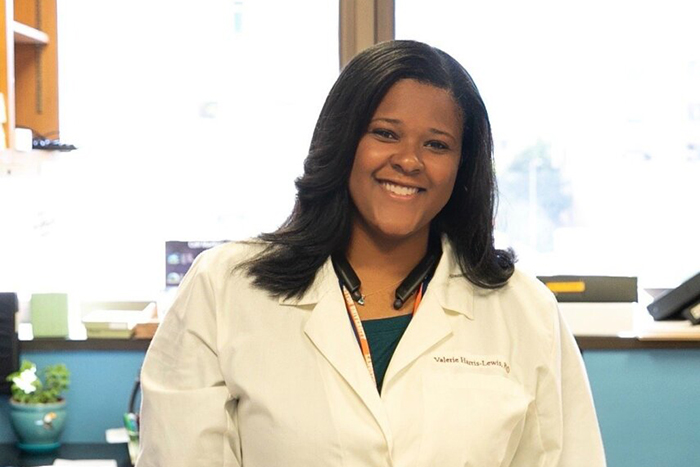Office of Research & Development |
 |


Dr. Valerie Lewis is an immunology researcher at the Oklahoma City VA Medical Center. (Photo courtesy BlackInImmuno.org.)
February 21, 2024
By Erica Sprey
VA Research Communications
"I'm proud to introduce young black students to research."
Dr. Valerie Lewis is an African American woman, a wife, a mother, and a VA researcher at the Oklahoma City VA Medical Center. She also teaches at Langston University, the country’s western-most Historically Black College or University.
As an investigator, Lewis is focused on better understanding lupus and Sjogren’s disease, both autoimmune disorders that predominantly affect minority women. In the past, research didn’t include people from different racial backgrounds, which caused problems when applying conclusions based on white patients to other ethnicities. Not only is Lewis correcting this historical problem, she is inspiring others to follow in her footsteps as a strong advocate for representation in research and medicine.
“Many of our Veterans are from different races and ethnicities, so it's very important to have scientists and clinicians that represent them,” Lewis said. “When I tell Black Veterans that I’m a scientist, they light up. They are proud of me, almost like I’m their child. I want to ensure the next generation can feel that same sense of pride.”
Lewis said both of her parents “grew up dirt poor,” but through their values of hard work and excellence in education her father graduated from the University of Oklahoma with a business degree, and her mother graduated with a degree in computer science. This allowed them to pass on those same values and better opportunities for her and her brother.
Lewis attended college at Oklahoma State University for her freshman year, but a trip to visit southern Black colleges changed her trajectory. Her uncle, who was a charter school administrator, challenged her to apply to Spelman University in Georgia. She took on that challenge and said attending Spelman proved to be a game-changer for her.
“It was a completely different environment for me,” Lewis said. “I went to predominantly white schools as an adolescent, so meeting these beautiful Black Women, who were as smart or smarter than me, was eye opening.”
After graduating from Spelman, Lewis took a job as a grant coordinator at Langston University. It wasn’t until she started accompanying students to summer research programs that she discovered her interest in research. Lewis was accepted to a postbaccalaureate research program at Baylor College of Medicine (BCM) in Houston, and then transferred to Wayne State University School of Medicine in Detroit with her BCM mentor. Her studies at the time focused on metabolism and women’s reproductive health.
Lewis returned to Oklahoma to complete her PhD in pathology at the University of Oklahoma. It was there she met her colleague and mentor, Associate Chief of Staff for Research, Dr. Hal Scofield, who is a rheumatologist at the Oklahoma City VA. It was through Scofield’s influence that Lewis changed her research to focus on autoimmune diseases like lupus.
After graduation, Lewis joined the Oklahoma City VA as a research investigator and continues to work with Scofield in his lab to this day. In 2021, Lewis received a VA Office of Research and Development Diversity, Equity, and Inclusion Supplement Award to study the effects of X chromosomes on the development of autoimmune diseases like lupus.
Lupus is a disease where the immune system mistakenly attacks the body itself, causing inflammation that can result in kidney disease, headaches, vision changes, blood disorders, and more. Not only are nine out of 10 patients with lupus are female, but the disease is much more common in people of African American, Hispanic, and Asian descent. According to the National Institute of Diabetes and Digestive and Kidney Diseases, one out of every 250 African American women in the U.S. will develop lupus.
Lewis’ team in Oklahoma works with groups in Denver, Colorado, and Cincinnati, Ohio, to study genetic data from the VA Million Veteran Program, which holds secure information on more than 250,000 minority Veterans and 100,000 women Veterans and more people of African ancestry than any other research program in the world. Lewis said that diversity allows her to chart new ground in health science.
However, Lewis is not just bringing diversity directly into scientific research, she’s also encouraging diversity in the next generation of researchers through the VA’s summer research program, which she established at Langston University with Scofield. The program is now in its third year.
“I’m proud to be introducing young black students to research—a career path that I didn't even know existed at their age,” Lewis said. “I tell them they have to be resilient and work hard, because being in a space where you are heavily underrepresented tends to be difficult. You have to brush off microaggressions and keep moving. Find the spaces and allies where you can flourish and be yourself.”
VA Research Currents archives || Sign up for VA Research updates